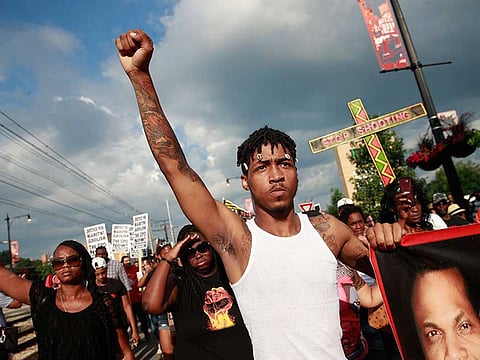Hundreds protest in Chicago over police shooting
Turning up the heat this summer is the pending trial of Jason Van Dyke, the Chicago police officer charged with first-degree murder for shooting Laquan McDonald 16 times

CHICAGO: Tensions escalated in a Chicago neighbourhood Monday, a day after the city police released a video showing officers skirmishing with a black man and then shooting him in the street on Saturday.
A rally late Monday on the spot where the shooting took place attracted about 200 people who chanted in unison. Some onlookers argued in the middle of the street about whether or not the police had a good reason to shoot. Two police helicopters hover overhead. In a flash, a middle-aged man darted up to police officers watching the scene and screamed.
“Human beings don’t behave like that!” he said. An elderly woman from the corner joined his chorus. “You’re hurting people,” she yelled.
“It’s gotten worse since Saturday,” said Kay Thomas, 16, who was carrying groceries home from the corner Walgreen’s. “I never saw my neighbourhood this upset.”
For many black and Latino residents on the city’s South and West sides, it is unquestionable that the Saturday afternoon shooting of Harith Augustus, a barber in the South Shore neighbourhood, is connected to the 2014 police shooting of Laquan McDonald, an unarmed 17-year-old. The aftermath of that shooting resulted in an incriminating report by the US Department of Justice into practices by the police department, the electoral ouster of State’s Attorney Anita Alvarez, the firing of Police Superintendent Garry McCarthy, and fresh vulnerability for Mayor Rahm Emanuel who is in the midst of a reelection bid for a third term in February 2019.
Turning up the heat this summer is the pending trial of Jason Van Dyke, the Chicago police officer charged with first-degree murder for shooting McDonald 16 times as he backed slowly away. A police dashboard camera video in that case was released more than a year after Emanuel narrowly won a second term for mayor. Van Dyke’s attorney is trying to move the trial from Chicago because he argues the officer will not get a fair trial here.
Many here perceive the outcome of that trial will be a watershed moment on whether or not the system of justice works in their favour.
“Nobody is taking [violence] seriously. The police aren’t. The alderman isn’t. The mayor don’t give a damn. The community is the only ones taking it seriously,” says Janet, 58, a neighbourhood resident who did not want her last name used.
Unlike the McDonald case, Chicago Police released the Augustus tape to the public the next day. It shows two female officers approaching Augustus as he stands on a sidewalk calmly talking with another officer. One of the officers grabs his wrist from behind, which causes him to spin around and run. A gun is flashed as his shirt flies up, and he is shot as he runs off. There is no audio, and the circumstances related to the shooting are unknown. Police say the officer was placed on desk duty for 30 days; the shooting is under investigation by the Civilian Office of Police Accountability (COPA).
Activists in groups like Black Lives Matter and the Chicago Alliance Against Racist and Political Repression say that is not enough. At the march late Monday, which travelled to the barbershop where Augustus worked, they called for the release of the officer’s name and her firing. They also are calling for an all-elected civilian council that will replace COPA and have oversight on all matters related to police misconduct. The majority of COPA, which was formed following the McDonald shooting, are Emanuel appointees.
There were those on Monday who recognised that the police have a difficult job. But they questioned the decision to shoot to kill and say they want more video with audio released to give the full picture. Bill, 50, who did not want his last name used, said he watched the video and was troubled that the confrontation escalated. “It should have been handled differently,” he said. “I just hope that what comes out of this is something good.”
Since the McDonald video was released nearly three years ago, rallies and marches have become a way of life in Chicago as protesters have performed die-ins at city hall, have shut down Christmas shopping along Michigan Avenue, and regularly march in the Loop. The weekend before the Augustus shooting, 3,000 people marched down the Dan Ryan Expressway to protest gun violence.
All of the protests so far in Chicago have been nonviolent. However on Saturday night, a five-hour march ended in baton-wielding police officers chasing and striking protesters, some of whom threw rocks and glass bottles in their direction.
Emanuel has not yet made a public statement about Saturday’s shooting and the street violence afterward.
Emanuel has become a focus of critics who say that his priorities are wrong when it comes to investment in the city, favouring downtown and North Side development from neighbourhoods that need jobs and infrastructure. His opposition has been particularly critical of a $95 million police and fire academy he pushed through for city council approval in May.



